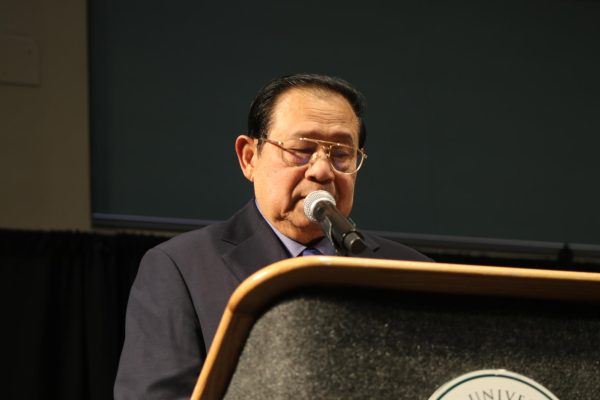The International Conference on Genocide wrapped up on Saturday at Sacramento State, including a special conversation with the former President of Indonesia.
The third day opened with a “special session” at 9:00 a.m. in the Forest Suite, before leading into several concurrent sessions in various rooms of the Union. The conversations around the genocide in Rwanda continued and expanded to other nations with the addition of panels about Indonesia.
The former President of Indonesia, Susilo Bambang Yudhoyono, discussed the effects of the East Timor Crisis during the plenary presentation and his experiences as a leader in a time of need.
“Maintaining unity and harmony […] is the responsibility and the duty of national leaders to ensure that we are able to maintain togetherness,” Yudhoyono said.
Yudhoyono covered topics such as government involvement in rebellion, policy changes and the military. Yudhoyono said he feels that the military should not be involved in politics; he prioritizes putting civilians in government to maintain the relationship between the public and government.
Yudhoyono closed the plenary session by talking about how he hopes future leaders in Indonesia and officials outside of the country will incorporate teamwork into running their nations.
“I hope the Indonesian experience can be useful to others in similar situations today,” Yudhoyono said. “And convince them, inspire them, that with craft and courage, there is the light at the end of the tunnel.”
RELATED: Day 2 of the International Conference on Genocide reflects on trauma and healing
Sac State anthropology professor Data Barata, who attended the plenary session, said that while no leader is perfect, their work should be recognized. He said conversations should be had around complicated topics such as the East Timor Crisis.
“I think it’s really extraordinarily important to appreciate [Yudhoyono], a former military general, transitioning from a military dictatorship situation to a civilian emerging democratic arrangements,” Barata said. “It is important to hear from individuals like this in many ways.”
Barata said that seeing individual leaders like this can be empowering for students and their social movements. He said even in the extreme situations these leaders have faced, student activism was still part of the equation through global movements and events like this conference.
“Student movements have become the social energy of change, a force that whether they like or not, folks in power have to recognize,” Barata said. “They are, in more than one way, voices for the voiceless. Voices for people who are unable to stand up for themselves.”

Historian and Sac State history professor Dr. Michael Vann got to sit in with President Yudhoyono and facilitate the panel. He said that this conference provided him with a ‘dream come true’ opportunity, and he hopes Sac State will hold more events like this with voices from around the world. He said making international connections is a great learning opportunity for Sac State students, and he hopes it’ll inspire international students to enroll.
“President Wood is regularly talking about the direction he wants to take the campus. Internationalization is a big part of that,” Vann said.
The event concluded with a ceremony which included a Gala and featured a Dabke performance by Sac State students, bringing the night and overall conference to an end.
Mark Wheeler, Sac State philosophy professor and senior advisor to President Luke Wood, said he worked hard with his colleagues to get the President of Indonesia and other important speakers here at Sac State.
“It was through friendship and good relationships that we were able to bring one of the world’s leaders of one of the largest democracies in the world, to our campus,” Wheeler said. “It speaks to how powerful and important friendship is for peace and for the kind of work we’re trying to do, which is to end genocide.”
Additional reporting by Brionna Woody and Evan Patocka.

































































































































